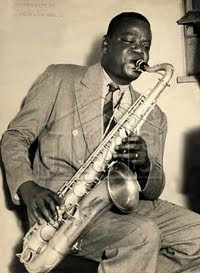1 X 0
There has always been a tight association between music and soccer in Brazil, to this day Brazilian soccer is often referred to as 'samba football' in the media, although it was a choro music celebrity, who linked the association of soccer and music from the start. Pixinguinha's choro "Um a Zero" is the first registered Brazilian composition that celebrates soccer and its players. The background of the title is documented in this entry that also celbrates the first Brazilian star in a line of legendary Brazilian soccer players, Arthur Friedenreich.
 |
| Benedito Lacerda (flute), Pixinguinha (saxophone), c. 1946 |
"1X0" (Um a zero) is a well known and popular choro composed by Pixinguinha and recorded for the first time in 1946 as a co-work with Benedito Lacerda on a 78 rpm disc (Victor 800442A). Lacerda plays the melody part on flute, Pixinguinha contributes second voice and fill-ins on tenor saxophone accompanied by Lacerda's conjunto regional.
The title of this choro has a special background, the music was composed as a tribute to the Brazilian soccer team
that won the 1919 South American championship and its first international soccer title in a match with Uruguay with
the result 1-0 in favour of the Brazilian team (- thus the title, which in Portuguese reads 'um a zero').
 |
| The 1919 Brazilian soccer team |
The single goal which secured the Brazilian team victory and the championship was scored by Arthur Friedenreich, the first character in a line of famous Brazilian soccer players.
 |
| Arthur Friedenreich (source: Wikipedia) |
Arthur Friedenreich (1892-1969) was the son of a German immigrant and his wife, the daughter of a black freed slave. Due to his dark tan Arthur Friedenreich became the first black professional soccer player in Brazil. He started his career influenced by his father, playing for SC Germania, a Brazilian soccer team in São Paulo composed of German immigrants. After playing with a succession of São Paulo clubs from 1910 onwards, Friedenreich made his debut with the national team in 1914. He played twenty-two internationals, including wins in the 1919 and 1922 editions of the Copa América, scoring ten goals. On Brazil's 1925 tour of Europe, he was feted as the King of soccer (- and nicknamed 'The Tiger'). He also has a claim to the highest scoring record, but FIFA cannot prove these goals because of incomplete record-keeping.
 |
| Arthur Friedenreich secures the victory 1-0, 1919 |
As mentioned, Friedenreich was the first black professional soccer player in Brazil. He had to fight for his career both inside and outside the arena, because at that time soccer was dominated by whites and blacks were generally not accepted. He faced many barriers because of racism, and he could not always attend the same places where white players were. However, his scoring of the single goal in the 1919 match was a turning point that secured him accept and a deserved place in the Brazilian soccer's Hall of Fame. And it was to honor this first black star in a line of legendary Brazilian soccer players that Pixinguinha composed his 'choro vivo', "Um a zero" (1x0).
 |
| Multi string virtuoso Garoto (Anibal Augusto Sardinha) |
As a prelude to the alleged repeated success of the soccer World Cup 1950 in Brazil, where Brazil again was to meet Uruguay in the decisive final, Garoto (Anibal Augusto Sardinha, 1915-55) had recorded his version of "Um a Zero" in 1949 as a tribute to the Brazilian team. Unfortunately, this time Brazil lost the championship with the result 2-1 in favour of Urguay (- still a national trauma to this day!). However, the music recorded by Garoto forever stands out as one of the best recorded versions of Pixinguinha's choro
Pixinguinha's "Um a Zero" is the first registered musical composition that celebrates soccer in Brazil and honors its players. Although the music wasn't recorded before 1946 and copyrighted 1947, the score was composed at the time of the event it celebrates - Pixinguinha is said to have attended the audience at the legendary 1919 match between Brazil and Uruguay, and to express his enthusiasm for the result, he went straight home and composed the music of "1x0/Um a Zero".
NB!
The photos documenting the 1919 match betwen Brazil and Uruguay inserted above are copied from this source. The story of Arthur Friedenreich and inspiration for this entry owes thanks to this source.
---
Jo



